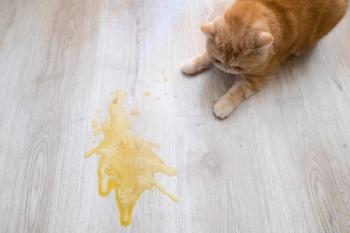
Feline alimentary lymphosarcoma: A review
This form of lymphoma is seen increasingly in cats, especially seniors. Two main types of alimentary lymphosarcoma affect cats: small cell and large cell. A recent article in Topics in Companion Animal Medicine reviewed the latest on diagnosing and treating both types.
Untitled Document
This form of lymphoma is seen increasingly in cats, especially seniors. Two main types of alimentary lymphosarcoma affect cats: small cell and large cell. A recent article in Topics in Companion Animal Medicine reviewed the latest on diagnosing and treating both types. Possible risk factors that have been considered for alimentary lymphosarcoma in cats include prolonged exposure to tobacco smoke, chronic inflammation such as that associated with inflammatory bowel disease, and diet. Diagnosis is difficult because so many other conditions can have the same clinical signs. Following is an overview of the management of the two types of feline alimentary lymphosarcoma. Read the full text for detailed diagnostic procedures and treatment protocols.
Small-cell lymphosarcoma: This form is much more common. Affected cats may show signs of weight loss and lethargy and may have thickened, ropy intestines on palpation. Routine blood work, a thyroid panel, a feline pancreatic lipase immunoreactivity test, and imaging can help rule out differential diagnoses. Definitive diagnosis usually requires examining a tissue sample; surgical exploration, although more invasive than other sampling techniques, provides the most diagnostic samples. Chemotherapy, usually with chlorambucil and prednisone, is the treatment of choice. Immunosuppressive therapy must be avoided before diagnosis because it can affect the results of diagnostic tests. The prognosis with treatment is good, with a mean survival time of 18 to 24 months.
Large-cell lymphosarcoma: Affected cats often exhibit anorexia, weight loss, and signs associated with obstruction and a septic abdomen. Affected cats may not have a history of vomiting and diarrhea, and most (> 80%) have palpable intra-abdominal abnormalities, such as organomegaly, a mass, or thickened intestines. The process to rule out differential diagnoses is the same as that for small-cell lymphosarcoma; however, examining a fine-needle aspirate can frequently result in a definitive diagnosis of large-cell lymphosarcoma. Care must be taken to differentiate between large-cell lymphosarcoma and reactive lymph tissue on diagnostic samples, as they can appear similar cytologically. Obtaining a bone marrow aspirate helps with staging: once the disease has disseminated to the bone marrow, the prognosis is worse and may affect an owner's treatment decisions. Chemotherapy with cyclophosphamide, doxorubicin, vincristine, and prednisone is the treatment of choice. The prognosis is poor, with a mean survival time with treatment of four to six months.
Wilson HM. Feline alimentary lymphoma: demystifying the enigma. Top Companion Anim Med 2008;23(4):177-184.
Link to full text:
Newsletter
From exam room tips to practice management insights, get trusted veterinary news delivered straight to your inbox—subscribe to dvm360.




